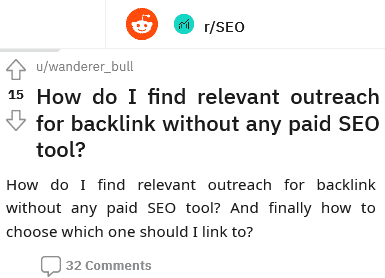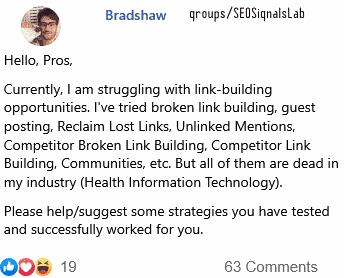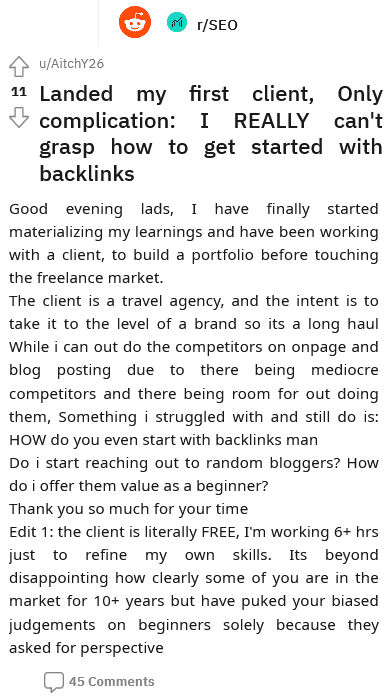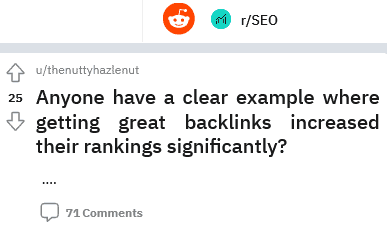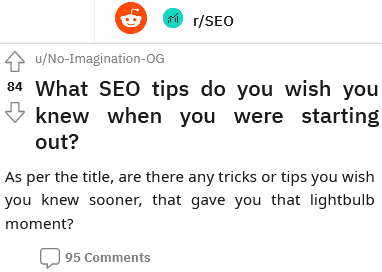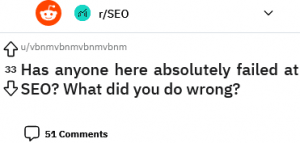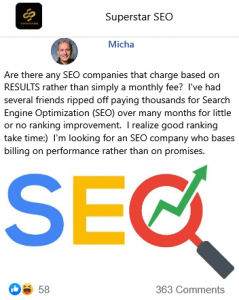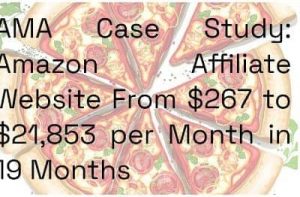Google's John Mueller said on Twitter this morning "you shouldn't be creating links to your site."
He is absolutely right. I don't create links. I let my staff create links for me. 😉
seroundtable.comGoogle: You Shouldn't Be Creating Links To Your Site
Google's John Mueller said on Twitter this morning
247 🤭136 👍🏽39488 💬🗨
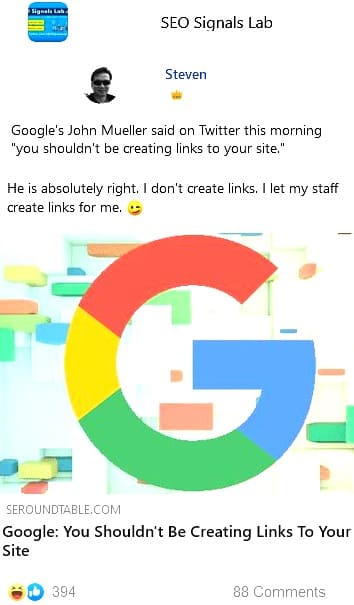
Translation: Our algorithm has a hard time detecting link building unless you do a really bad job so we can't figure out who's doing it.
💟🤭8
Warnock
If you want links that you (or staff) didn't create, just add a coupon page.
xyz. com/coupon
Bam you'll have like 10k links in 3 weeks 😆
💟🤭13
Ammon 🎓
People don't like it, especially those who bill clients for building the links, but he's absolutely spot on.
Some of us have been around long enough to remember when blog comment spamming worked. We can see the difference enough to tell you it doesn't work now. Some of us remember footer link spam, and again, we can see the difference enough to tell you it doesn't work now.
So, from that exact same perspective, of knowing what it looks like when a link is passing value, to what it looks like when it doesn't, I can flat out tell you that about 95% of all the links built by 'link builders' have zero value. They literally do nothing. 95%.
And the main types of link discounted are the ones anyone can build. Only a few 'guest post' links still carry weight, and those only on sites that are fussy and insist on good posts with actual value.
The only kind of link you can 'build' that has any chance of having any serious value is internal linking, and even that depends on some external 'juice' from somewhere flowing into the site to be distributed through those internal links.
For everything else, the value of the link is dependent on the editorial quality of the publisher, their refusal to post crap. Because it only takes a handful of links *to* certain PBNs and link rings to trigger total link devaluation as a part of that network.
Google are pretty ruthless on this. They dinged Forbes just for having that user generated 'opinions' section that spammers loved so much, and the same with several other similar ones. Those sections can no longer pass any PageRank, not even to their own other pages.
Remember, the Google disavow tool ties into a system for discounting links that they already had on the back end. A system for completely discounting any link to zero value without it showing anywhere 'out front'.
So full disclosure. I sell guest post links. I see multiple sites and the results that these links give. Based on evidence, many of them still work, and well.
Ammon 🎓 » Andrew
Based on evidence, *some* of them work, maybe only one, and it is enough.
I saw the top ranked site back in the days when Viagra was the most competitive affiliate space, be held there by ONE link. One. That is how powerful a good link can be, and how rare.
I've had multiple clients, in all sorts of competitive markets get ONE great link from a news source or an industry authority site and jump past a dozen competitors. Competitors who had, in many cases, been doing 'link building' for months or years.
Remember, even when 95% of links built are worthless, that still leaves 1 in 20 that is okay, and moves the needle. My problem with it is simply the waste of 95% of the time and energy on the ones that don't.
Andrew » Ammon
But yes agreed that some sites are blacklisted. But I've also seen obvious link farms move the needle. So 🤔
Ammon 🎓 » Andrew
It does happen, I agree. I always suspect Google is using those farms as honey traps, to track the entire link network. Because so often, a few months to a year later, a couple of dozen entire massive link networks go down, including the one I thought was a honey trap.
In some industries, that's no biggie. A few months is all you expect from the churn and burn anyway. But there are always casualties in smaller sites that had links to their main brand from those sources, and have hosed it.
Andrew » Ammon
On this note though, the way he's frames his answer is far from "spot on". Some SEO noob would look at this and think citations don't need to be built, and basic fundamental link building in general is not needed. At the end of the day Google wants to sell Ads, and whatever misinformation BS he sells to help them achieve that he will spin.
Ammon 🎓 » Andrew
But citations *don't* need to be 'built' in the active, do it yourself sense. Google themselves never, ever, built a link. In fact, their rise was particularly remarkable at the time (ask any WMW veteran of the time), because while all the other engines were spending millions on big TV ad campaigns, Google did no marketing activity of any kind at all. They just built the best damn engine and the best experience and let word of mouth do it all.
They didn't blog, they didn't run ads, they didn't shout all over social media. They just built their product better and better and let others do the talking. So you can see why they believe that is entirely possible.
Andrew » Ammon
Your reasoning makes 0 sense mate haha. Small biz is not Google.
Also Google was built over 15+ years… when you have clients they expect results somewhat quickly. Comparing building a search engine to building a small biz from scratch organically really makes no sense.
Ammon 🎓 » Andrew
My reasoning made me a mentor to a lot of pretty well known SEO users in their early careers, so if it makes actually zero sense to you, maybe you're in the wrong line of work.
You seem to have a very literal, rigid way of thinking, and very little inside knowledge of how marketing (or business development) actually works. I guess that's okay for someone who just writes copy, but it will massively limit your ability to grasp how search works, how marketing works, or even how to develop your own business.
There's this wonderful cafe nearby. Always packed. Does zero advertising. Just opened up where people pass buy and concentrated on great food, really great coffee, and good service. This works for ANY scale of business, online or off. Always has.
The one and only proviso is that they can survive long enough for that word of mouth to spread. Nothing else. It works for market stalls, it works for a guy with a van, it works for window cleaners, and it worked for Google.
It is generally HARDER for a big business, or something like a search engine, because their up-front investments into tech and expertise have to be so high. Their cash-burn rates generally don't allow them the sort of timelines many smaller businesses have to reach certain scales and milestones.
And you don't know any of this, despite it being all around you, all your life.
You know, maybe, just maybe, advertising that none of this makes any sense to you isn't a great way to brand yourself? My father had a saying "It is often better to be silent and be thought a fool, than to open your mouth and remove all doubt".
Andrew » Ammon
I understand it plenty. I specialize in organic, and basically all of my clients rank at the top of Google for most of their keywords ( including super difficult ones). I may not have a grasp of much outside of that, but I understand how to rank locally. Google is no one's friend in here. They are an Ad company (they make the majority of their money via Pay Per Click (PPC)). I think 99% of people in here agree with me on that point. Bringing the best search result was never in their best interest.
Ammon 🎓 » Andrew
I think you'd be surprised at how many understand Google better.
Google is set up with a VERY strict 'chinese wall' between the organic, search side of their business, and the ads part of the business, which was only added on years later. The two sides have virtually no contact at all, and organic results are generated before the ads side of the business get to fit their ads in to the product as a final step before display.
At no time, ever, is the placement of ads a part of the thinking, work, or processes of any of the folks that work on the algorithms and 'engine' of Google. It's in their contracts as a work condition, and strictly enforced.
I became friends with one of the leads of the ads side of Google some years back. He was senior, involved in a lot of the big projects, and even with that seniority, almost the only contact he'd ever had with the organic side was on the occasions where he had to teach one how it worked. They generally don't know, or have any reason or interest in knowing, other than the obvious. It's not a part of their work. No more than the director of a movie worries or cares what ads a cinema may show when they run the movie.
This once again ties back in part to the purist, 'for the science' roots of Google (they were the top engine, and 3 years in, before they even added advertising at all. Their first business model was licensing the tech for Intranets and third party use). Google's search engineers focus entirely on making the best search engine they can, without ever having to think about how to monetize it, other than by making it a product that everyone uses.
The other part, is once again that powerful legal team. Having proof that Google cannot even possibly be deliberately holding down organic results to make companies pay for ads, matters a lot to a company almost constantly in over 100 legal battles. There's literally BILLIONS of dollars on the line should even one anti-trust lawsuit go against them, so they enforce it pretty damn hard.
So the complete separation of the search engine from the advertising is one of the things that both sides, the academics and the bean counters, completely agree on.
Once again, this is no deep dark secret never shared before. This has been explained and published right back to the very start of showing ads on Google.
The entire Ads side is considered a 'display' side of the business, just like what logo to use, or what legal blurb might be needed in the footer. They only get to touch the page after the organic side has done its job, right before the page is displayed. It is never in any way a consideration for the engineers who generate organic results.
Maric » Ammon
I love this!
Ammon 🎓 » Maric
There's a reason that many of the hottest and fastest growing agencies in the past couple of years have been the "digital PR" agencies – the ones that specialize in getting other people to link to your site via public relations and publicity events.
The thing is, it is actually very easy to get links, right up until you need to target really fussy, often-pitched journalists and editors, of course. Those take a bit more work, but even those, if you do your research, have stuff they are so passionate about, so into, that they can't resist certain topics, events, etc.
All you do is work out what any given site editor loves to talk about, and has often linked to sources on before, then build the content they can't resist. That'll get you links from just about anywhere.
Maric » Ammon
Absolutely. Would love to maybe execute a backlink campaign someday, which would involve quality content and quick reaction to jump in front of trends.
Till then, respect for what Fery Kaszoni and his peeps are doing. Always exciting.
Ammon 🎓 » Maric
Some of the best link building and positioning I've seen, repeatedly, in my decades doing this stuff, is when a company spot what *will* become news in six months or a year, and start to hijack it in advance.
Build up the content, and a seed-audience that will give 'quality signals', before it bursts and triggers Google to crawl for fresh content relating to the new interest and intent.
What kind of news or event you can use depends on the industry, the market, of course, but there is always something if you think hard.
Maric » Ammon
"what *will* become news in six months or a year, and start to hijack it in advance."
this is gold!
Are you currently working on producing content like this.
Ammon 🎓 » Maric
Of course, even if only at the most basic level we all do – preparing for the Christmas content in the summer, working on our Easter Campaign starting at New year, etc. We know some things will become the focus, and so we prepare for them.
Bigger events or wider events are the same deal. What's going on in your industry? What will change in a few months? Predict the news, and create for it now. Try to predict future interests, future mindsets, and future situations.
e.g. we know a lot of people will be worse off financially this year as economies adjust to the new normals. We know more people are working from home than ever before. Do either of these things affect what your customers will be looking for or needing information about? How about the rise in people moving out of cities and into rural or suburban areas, does this affect your (or your client's) business, or your customer's needs?
📰👈
Edward 🎓
Have to agree Ammon, my test sites have shown just how fickle Big G is, and let's not forget that from the very beginning as you know, Google always talked about linking and 'bad neighbourhoods', so if they mentioned them then, they had the ability to identify them then, and that was way over 5 years ago, getting 20.
I believe Google has some sort of 'quality grading' system for sites, such as a simple traffic light for instance (For ease of explanation).
Any site that is 100% trusted goes into the green zone, and they are fine.
At the other end is the red zone, where they have been effectively removed from the PageRank system (Again for ease of explanation) and are effectively the 'bad neighbourhoods' Google Speakes about and should be avoided at all costs.
In between is the amber zone and these are the run of the mill sites, that are nothing special and get traffic etc, and are not totally trusted, and while they can easily get dragged down into the red zone, getting into the green zone is a tough task.
Now I've stuck to 3 zones for simplicity of understanding but in reality it would be far more complex.
Demna
what's wrong with building links?
That you needed to?
Just today alone, Amazon will gain a few thousand more mentions, citations, and links. Same with Google, Apple, Microsoft, and in fact any of the biggies.
Barry Schwartz got a link right here in this very thread.
They didn't need to 'build' those links. They just make stuff that people will *want* to link to, all on their own.
Andrew » Ammon
Amazon and other multi national companies are very different than your local Joe's plumbing who is just starting out and has 0 referring domains. Places that attract links naturally based on brand alone generally don't need links, but a lot if smaller non newsworthy companies do. Big difference.
Ammon 🎓 » Andrew
You have a lot of misconceptions about Google. This one where you think hundreds of scientists who specialize in statistical analysis, information retrieval, probability vectoring in N-space matrices, etc. are not applying it to the whole web, big sites and small, is the one that will lead you the furthest astray.
Start with the scientists. Google wasn't one of the many engines built by stockbrokers or venture capitalists, money men, who then hired some poor technical folk to build their money machine. It was dreamed up, by 2 scientists who were still students at Stanford at the time, who simply wanted to find a way to solve one of those science problems that one of their role models had posed.
The role model in question was Jon Kleinberg, a very famous and influential professor, who inspired the people behind almost every major search engine. His paper on Hubs and Authorities, and the HITS algorithm, led to IBM's CLEVER project – a working proof of a completely link-based algorithm, but one that was unusable in the real world because it simply couldn't scale.
Page and Brin believed they could find a way to create a link-graph that would be more scalable, and thus have commercial and practical use. Larry Page was the 'Network Theory' guy, this was closer to his special passion, and so that's why PageRank is named for him. (Brin was a lot more into the exciting ideas of the Knowledge Graph and better understanding of Semantics and Natural Language Processing (NLP)
Because they were students, using university time and resources, the actual patent for PageRank belongs to Stanford University. No kidding. They were fully aware it would be that way, and didn't mind at all, because those are the things that help universities to grow, get funding and donations, and be where people want to send their gifted kids.
Brin and Page are those scientist types, believing in pushing forward knowledge for the good of all. The entire structure and culture of Google was built that way, and far more resembles an academic environment than any business one.
But they only even started their own company, creating Google, *after* they tried (and failed) to simply sell their algorithm for a pretty paltry sum of about $1m. They pitched all of the major search engines, including Yahoo, and were turned away.
However, a few folks were so impressed by the potential that they told those two science students to form a company, and they would write them a check, right then and there, to invest in it. One of those was Jerry Yang of Yahoo at that time. Another was one of their own professors.
One of the biggest 'secrets' hidden in plain sight about Google is that they are not a search engine. They are a tech company. What made all of their incredible algorithms, big data analysis, and sheer scale possible was the hardware side and the software side. Particularly the work of another scientist they hired: Dean.
Today, it is easy to take cluster networking and the cloud for granted. But professor Dean is its father, and Google was the proving ground. Before Google, all internet companies, and I mean all, used huge, powerful servers. These kinds of servers were really expensive, not just in themselves, but because you needed to buy yet another license for all of the software etc you needed to run on each machine. Just to run an Oracle database on the servers cost you $50k per server.
Dean was the pioneer of cluster networking, where ordinary, even low-end, domestic computers could be clustered together and share tasks between them. It allowed Google to scale their hardware, and their processing power and storage capacities, in a way never, ever seen before. Processing tasks that were simply not possible, even on IBMs best super-computers used for projects like Kleinberg's, were suddenly not just possible, but could be treated as background tasks.
And, like the true academic and scientist, Dean went on to spend years happily lecturing and teaching others how it worked, how to push it forward, all while still in Google's employ.
Every single use of cluster networking, cloud services, or VPNs out there, is traceable back to the generous work and sharing of Dean, under Google.
That's who Google really were.
Unfortunately – politics.
The great masses of humanity get to vote for who writes the laws and rules of society. As such, they are the ones responsible for the laws on businesses, and particularly that once any business reaches a certain size, it has to declare all of its finances and figures for oversight, and that the most economical way to handle being above a certain size is to float the company on the stock market, because public companies like that get better treatment and advantages.
So, Google needed to IPO, or suffer badly. For that, they need to hire a Chief Executive Officer (CEO) who was a traditional money man, the type of person traditional stock fund investors and others would feel more confident investing in. And that's where a lot of the reins of Google had to be handed over to the kinds of people who f*ck everything else up.
That's the point where Google's mantras changed, and they went from altruistic improvement of the world to having to obey the laws created by the politicians we the public are responsible for – such as the legal duty, by law, that they must make decisions that maximize the return for investors.
Suddenly, the most powerful department inside Google was one that had barely existed before – the Legal Department. Not because Google's founders wanted it that way, and certainly not because Google's staff voted for it, but because that is the system we, citizens of a democratic world, are responsible for creating and keeping.
Matt Cutts was in a fairly unique position. He was one of the original ten employees. He held significant shares in Google – voting shares too – and so he could have a certain freedom to speak about stuff that the legal team would have loved to silence him on, but he outvoted them (and scared them).
Gary Illyes is the closest in many working ways to Matt's position, and is given more freedom than most in Google – he's about the only one ever allowed to talk about anything theoretical at all – but he has nowhere even close to the freedom and power that Matt had. Gary, John, and all others, have to get permission from the legal team for all sorts of stuff, and have to run past them anything they want to talk about.
It is absolutely fine, normal even, that you were likely blissfully ignorant of all this. Most people are. The Google founders themselves included when they were just excited students working on a cool science project. But those are the realities of corporate level enterprise, never mind global-scale mega corporations.
And now you know. Bear it in mind. It explains a lot of the internal and external decisions (and conflicts) of Google.
📰👈
Cedeno
Why do we give this man gas?
Mueller has contributed as much to Search Engine Optimization (SEO) as Bezos has to the IRS.
Before John Mueller was recruited by Google, (just over 14 years now he's been at Google), having the degree-level education they insist on, John spent a lot of time doing the job that Google eventually hired him for – Helping Webmasters.
He was an active member of many of the top webmaster and SEO forums of the day, and most especially of Google's own Webmaster Help area. He literally helped thousands that way.
But how he'd started down that path was that he'd developed the first and best tool that would auto-generate a sitemap in the XML format Google had just adopted.
So John was very well known in the SEO community, and had done a huge amount for thousands of people, and literally millions of websites.
You, on the other hand, I have never heard of.
Cedeno » Ammon
I see your point, but it become moot when every recent SEO press article or tweet mentions Mueller going back on his word.
From what it appears, it seems he's been out of the loop as to how the Google platform works now. Also, every SEO Facebook Group post gripes about Mueller's communications to the community. It's draining to see everyone talking about this man.
And forgive me for not emphasizing his contributions to SEO, but there are hundreds of other SEO users that have contributed a considerable amount to search without the attention.
I just want to stop seeing Mueller in my timeline or my newsfeed at this point.
Ammon 🎓 » Cedeno
Every now and again, John, or those who were added later to the 'Webmaster Public Relations (PR) team' (whatever its current official name) such as Gary and Martin, say something that seems really, really certain.
Like "No, we don't use children's toys as part of our systems".
And then someone in some corner desk in one of the remote offices around the world will say "Um, well… We're actually reexamining the use of Lego right now
http://infolab.stanford.edu/pub/voy/museum/pictures/display/0-4-Google.htmSo, through no fault of their own, or of logic and reason, they'll have to backtrack a bit.
Then there's stuff they know they simply don't know without doing a lot of checking. For example, anything that is a rule written by machine learning isn't something any human will have announced looking at or working on. And there is always the chance that one of the ML systems found that a bold, red exclaimation point "!" is a 86% signal of spam, rising to 99% spam probability if it is directly touching another "!!!"
(That too is actually a genuine real world thing from a Bayesian spam filtering system).
It happens. It's pretty rare that they have to take back anything stated. Far more often they have to duck a question or say they can't be sure, because it'll take them a week to find out, and Google kind of have other jobs they are meant to do in a week.
I'm struggling to think of even one instance, in all the years I have known him, where John has ever given his word and gone back on it. I have seen things change, so what he said was true at one time is not longer true, and now he's told everyone that has changed (we call this honesty).
Since you say you are seeing these in "every recent SEO press article or tweet" perhaps you can share just one example.
As for "Also, every SEO Facebook Group post gripes about Mueller's communications to the community", I promise you, the good ones, especially the invite only professional ones, don't have that.
John, more than any other Googler I've known, genuinely goes above and beyond in trying to be genuinely helpful, even when Google's legal dept are glaring at him menacingly should he go one iota too far in what he's allowed to say.
INFOLAB.STANFORD.EDU📰👈




